PDF chapter test TRY NOW
I
June 24
The first day of monsoon mist. And it’s strange how all the birds fall silent as the mist comes climbing up the hill. Perhaps that’s what makes the mist so melancholy; not only does it conceal the hills, it blankets them in silence too. Only an hour ago the trees were ringing with birdsong. And now the forest is deathly still as though it were midnight.
Through the mist Bijju is calling to his sister. I can hear him running about on the hillside but I cannot see him.
June 25
Some genuine early-monsoon rain, warm and humid, and not that cold high-altitude stuff we’ve been having all year. The plants seem to know it too, and the first cobra lily rears its head from the ferns as I walk up to the bank and post office.
The mist affords a certain privacy.
The mist affords a certain privacy.
A school boy asked me to describe the hill station and valley in one sentence, and all I could say was: “A paradise that might have been.”
June 27
The rains have heralded the arrival of some seasonal visitors—a leopard, and several thousand leeches.
Yesterday afternoon the leopard lifted a dog from near the servants’ quarter below the school. In the evening it attacked one of Bijju’s cows but fled at the approach of Bijju’s mother, who came screaming imprecations.
As for the leeches, I shall soon get used to a little bloodletting every day.
As for the leeches, I shall soon get used to a little bloodletting every day.
Other new arrivals are the scarlet minivets (the females are yellow), flitting silently among the leaves like brilliant jewels. No matter how leafy the trees, these brightly coloured birds cannot conceal themselves, although, by remaining absolutely silent, they sometimes contrive to go unnoticed. Along come a pair of drongos, unnecessarily aggressive, chasing the minivets away.
A tree creeper moves rapidly up the trunk of the oak tree, snapping up insects all the way. Now that the rains are here, there is no dearth of food for the insectivorous birds.
Explanation:
The lesson gives us a glimpse into the diary of Ruskin Bond. The first day being talked about was June \(24\). It was the time around which the monsoon started, and the mist had wrapped the hills in silence.

Mist wrapped the hills
As written, June \(24\) was the first day when the mist appeared. The author called it “strange” as all the birds suddenly went silent when clouds of mist climbed up the hill.
The author claims the mist to be melancholic in nature for two reasons. First, it covers up the mountains and hides the serene view. Second, it silences the birds, thereby bringing sadness.
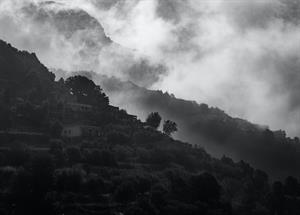
Melancholic view
An hour before the mist appeared, the trees were lively with birds' songs. But then, it became so still and silent. The author called the forest “deathly” as it was so dark that it looked midnight, and the forest was wrapped in utter silence.
The author could hear Bijju calling out for his sister but could not see him through the mist. He could make out that Bijju was running about on the hillside.
On the \(25\)th day of June, the hills witnessed some early monsoon rain, which brought with itself warmth and humidity. It was different from the showers the hills receive all year that cools environments at such high altitudes. The plants also knew very well that the monsoon had arrived. The author describes as the first cobra lily of the season reared its head, making its way among the ferns as the author walked till the bank and the post office. Upon being asked by a school boy, the author described the hill station and valley as “A paradise that might have been”, implying that during the monsoon season, the hill station and valley were heavenly and hence the description.
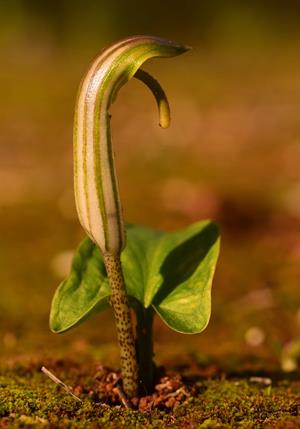
Cobra lily
In the entry on \(27\)th June, the author mentions how the rain had brought with it a few seasonal visitors like the leopard and lots of leeches. On the afternoon of the day before, the leopard attacked a dog. The latter was lifted from near the servants’ quarter below the school. In the evening it almost took one of Bijju’s cows but ran away as soon as Bijju’s mother came crying and screaming.
As the presence of leeches were increasing during the monsoon, the author says that losing little blood to them every day has become unavoidable. He mentions a few other creatures that arrived with the rain such as the scarlet minivets-bright red birds that look like cuckoos; however, their female-counterparts are yellow. They move swiftly and lightly among the leaves giving the appearance of brilliant jewels around them. These birds are so bright in their colour that regardless of how leafy the tree is, it was difficult for them to hide themselves. Sometimes they manage to go unnoticed by remaining silent. A pair of Drongos also came along. These birds, quite unnecessarily aggressive in nature, chased the minivets away.
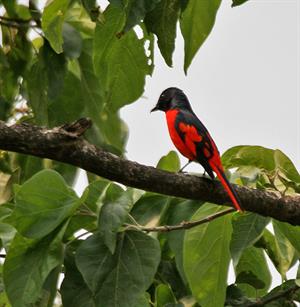
Scarlet minivets*
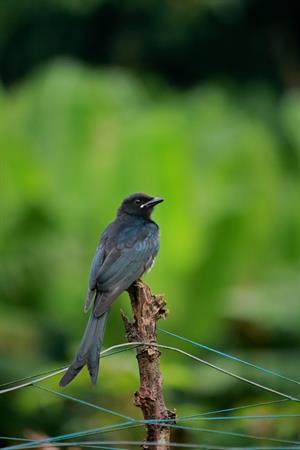
Drongo
During this time, a treecreeper grew up the trunk of the oak tree, plucking insects on its way. The rainy season ensured that were was no lack of food for those birds that fed on insects.
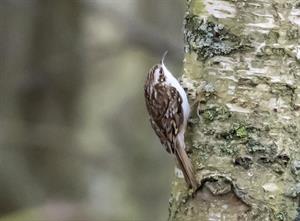
Treecreeper
Meanings of difficult words from the paragraphs:
No | Words | Meanings |
1 | mist | a cloud of tiny water droplets suspended in the atmosphere at or near the earth’s surface that limits visibility |
2 | melancholy | a feeling of sadness |
3 | conceal | to hide something |
4 | blankets | to cover completely with a thick layer of something |
5 | deathly | resembling death |
6 | genuine | real and exactly what it appears to be |
7 | rears | brings up |
8 | privacy | a state in which one is not observed or disturbed |
9 | paradise | an ideal place |
10 | heralded | be a sign that something is about to happen |
11 | imprecations | a spoken curse |
12 | bloodletting | withdrawal of blood |
13 | scarlet minivet | a small bird found in tropical southern Asia |
14 | flitting | move swiftly and lightly |
15 | contrive | arrange for something to happen |
16 | drongo | a songbird with glossy black plumage found in Africa, southern Asia, and Australia |
17 | aggressive | ready or likely to attack |
18 | dearth | a scarcity or lack of something |
19 | insectivorous | feeding on insects, worms, and other invertebrates |
Reference:
National Council of Educational Research and Training (2006). Honeydew. A Short Monsoon Diary (pp. 109-117). Published at the Publication Division by the Secretary, National Council of Educational Research and Training, Sri Aurobindo Marg, New Delhi.
Scarlet minivets*: J.M.Garg, CC BY-SA 3.0
